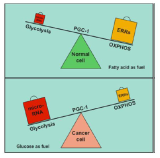Vincent Giguere
Professor/Professeur
Rosalind and Morris Goodman Cancer Institute
Department of Biochemistry
Faculty of Medicine and Health Sciences
McGill University

1. Fellow, Academy of Sciences, Life Science Division, Discipline of Molecular Biology and Genetics, The Royal Society of Canada, 2013
The focus of Dr. Giguère’s laboratory is to investigate the mechanisms governing the transcriptional control of bioenergetic pathways in normal and cancer cells by nuclear hormone receptors. Nuclear receptors constitute a class of transcription factors that directly relays nutrient and hormonal signals originating from outside the cell to its nucleus where they bind to specific sequences within the regulatory regions of their target genes. We currently explore the roles played by several members of the superfamily of nuclear receptors in physiology and diseases, especially hormone-dependent cancers. To this end, we use an approach referred to as physiological genomics.
1) Metabolic control by orphan nuclear receptors. Nuclear receptors have been shown to play important roles in this process as they can translate hormonal, nutrient and metabolite signals into specific gene expression networks to satisfy energy demands in response to distinct physiological cues. The estrogen-related receptors (ERRα, β and γ) are nuclear receptors that have yet to be associated with a natural ligand, and are thus considered orphan receptors. Using functional genomics as a tool, our laboratory has shown that the ERRs control vast gene networks involved in all aspects of energy homeostasis, including fat and glucose metabolism as well as mitochondrial biogenesis and function. Our group also use mouse models to study the roles played by the ERRs in development and/or survival of the organism when subjected to a variety of physiological challenges such as exercise, exposure to cold or changes in diet.
2) ERR signalling in breast cancer. The ERRs were initially investigated in breast cancer because of their structural relationship with estrogen receptors. Recent data have shown that the ERRs control vast gene networks involved in glycolysis, glutaminolysis, oxidative phosphorylation, nutrient sensing and biosynthesis pathways. In the context of breast cancer, the ERRs impact cellular metabolism in a manner that promotes a Warburg-like phenotype. The ERRs also modulate breast cancer cell metabolism, growth and proliferation through the regulation of key oncoproteins such as ERBB2. We study the value but also the implications of the complexity of targeting the ERRs for the development of cancer therapeutics.
3) Crosstalk between mTOR and the ERRs in metabolic control. mTOR and ERR are key regulators of common metabolic processes including lipid homeostasis. One goal of the laboratory is to explore how these factors cooperate in the control of metabolism. Recently, our work using ChIP-sequencing analyses revealed that mTOR is in fact a transcriptional coregulator that occupies promoters of genes on a genome-wide scale including enrichment at genes shared with ERRα that are involved in the TCA cycle and lipid biosynthesis. Our work thus expanded the role of mTOR action in metabolism and highlights the existence of a potent mTOR/ERRα regulatory axis with significant clinical impact.
